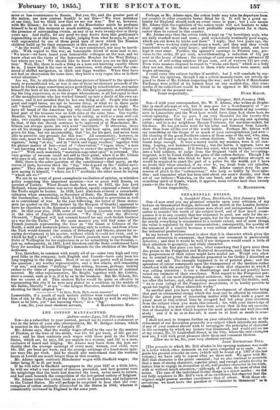Glasgow, 30th January 1855. Sin—I wish your correspondent, Mr. W.
B. Adams, who writes so Bright- like (a small attempt at wit, but it may pass for a Scotchman's) of " ar- tificial manufactures," would inform us what the thousands of my country- men in Lancashire and the West here would have done had there been no cotton-spinning. For my part, I am very thankful fur the twenty-five years' employment that 1 and my family have got in piecing and spinning cotton ; and so is my neighbour Deacon Firebrace, the machine-maker, for his share. He has got more work for his lathe and hammer from Lanark- shire than from all the rest of the world beside. Perhaps Mr. Adams will say something on the theme of so much of your correspondence just now— the clearing of the great Northern estates of those sons of the soil, who, alas, have not all found a refuge in the cotton districts. The mill has not been found large enough. It were a merry world, my masters, were it all run- ning, leaping, and hammer-throwing ; but the lairds, it appears, have no need of a bold peasantry. If it does not exist, what may be easily converted into a bold soldiery, to judge from the frequent visits of the recruiting- sergeant, is to be found within the gates of the cotton-factory. Though I do not agree with those who think we have so much superfluous strength as would be required to enact the part of a police for the world, yet 1 have no doubt that when attacked, if we ever be, we, fresh from our spindles, will render a good account of ourselves. Mr. Adams cannot deny the pos- session of pluck to the "cottonocracy," who keep so boldly by their spin- dles : and remember what has been said about one man's destiny, and that act of our fathers—Waterloo, on the one hand, and on the other the en- croaching spirit of Russia, which, it appears, dates further back than twenty years—to the days of Peter. Yours respectfully, G. Meow:moos


































 Previous page
Previous page